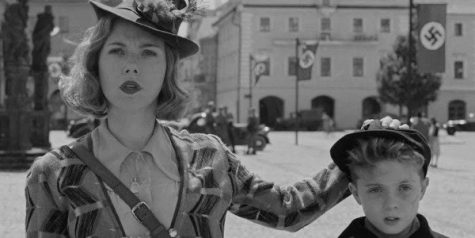“Greener Grass” is an American comedy film directed by Jocelyn DeBoer and Dawn Luebbe. In their directorial debuts, they craft a surreal and absurd film that characterizes modern suburbia in a bizarre manner.
Throughout this pastel, sun-bleached rendering, the viewer is whisked into a world where adults wear braces on already straight teeth, everyone drives golf carts, and children have the capacity to miraculously transform into golden retrievers.
“Greener Grass” hilariously generates discomfort which prevails throughout the film with the use of close-up shots. These shots show the mouths and facial expressions of characters in a way that is almost too personal, wholly immersing the viewer in the film’s awkward universe.
It begins with a scene in which two mothers, Jill (Jocelyn DeBoer) and Lisa (Dawn Luebbe), watch their children play a school soccer game from the sidelines. As they engage in conversation, Lisa coons over the beauty of Jill’s infant, Madison. To establish the comedic nature of the film, Jill forgets about her baby’s existence and cheerfully offers her child to Lisa. When Lisa immediately accepts, the viewer realizes that “Greener Grass” is going to be a very strange comedy. Through stoic and stifled performances, DeBoer and Luebbe carry the film on their shoulders.
As the film progresses, Lisa attempts to take over every single aspect of Jill’s life. In doing so, she first claims Madison as her own by renaming her Paige. This serves to integrate Paige as a part of Jill’s family and make Paige a symbol of the deep-seated conflict that exists within their frenemy dynamic. While this conflict alone would create a film with a centralized storyline, the film deviates by implementing a subplot involving a psychotic yoga teacher who shakes the suburb’s residents by murdering a grocery store clerk.
This greatly affects the residents when the crime occurs in a grocery store, an establishment central to the suburban nuclear family. However, it is not necessarily a part of Lisa’s effort to adopt aspects of Jill’s life as her own. In the midst of the murder investigation, Lisa and Jill fight for acceptance in a world which appears indifferent to their struggle. This significantly lowers the stakes of their struggle and decreases the film’s overall quality.
“Greener Grass” also incorporates strange tidbits which push the film forward in the midst of a decentralized story. For instance, Jill’s husband, Nick (Beck Bennett), finds himself hilariously attracted to the taste of pool water and Lisa discovers that she is pregnant with a soccer ball. These unexpected developments add to the film’s comedic value but fail to enhance the viewer’s emotional investment in the characters.
Overall, the scenes resemble dead-pan comedy sketches, making good use of sardonic and absurdist humor. While the scenes are tied together as comedic relief, it makes the storyline difficult to follow. This structure also complicates the viewer’s ability to correlate the film’s developments vis-à-vis the frenemy relationship between Jill and Lisa.
While many of the scenes made me chuckle, the execution of the film’s foundational story left me dissatisfied. The absurd incongruity of “Greener Grass,” however, somewhat convinces the viewer to continue watching.
Overall, while the film’s uniqueness may elevate it to a cult-classic, there is little reason one has to view this beyond for its comedic gimmicks.





